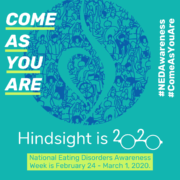It’s About More Than Just Food
When you hear the phrase “eating disorders,” your mind immediately thinks about food, but what most people do not know is that eating disorders are so much more than just food. Although eating disorders are characterized by an obsession with food, body weight and size, the root of an eating disorder is so much deeper.
What is an Eating Disorder?
- A way to feel in control when everything else in your life feels out of control
- Numbing your undesirable feelings with lack of nutrition
- An attempt to achieve higher self-esteem and perfectionism through body image
The most common eating disorders are anorexia nervosa, bulimia nervosa, and binge-eating disorder. They each have their own signs and symptoms, but have an equally negative impact on someone’s health, emotions, and ability to function in day-to-day life.
Signs and Symptoms
People with eating disorders usually do not think they have a problem. Here are some signs and symptoms to look for if you think someone in your life may have an eating disorder:
- Skipping meals
- Making excuses for not eating
- Intense dieting
- Excessively working out
- Avoiding social activities involving food
- Eating alone rather than with others
- Lots of talk about body image or weight
- Using dietary supplements or laxatives
- Using the restroom immediately after mealtime
- Eating much more food than a normal portion
- Shame or guilt around eating
If you are worried that you, or someone you love, has an eating disorder, the best thing you can do to support them is show them love. Eating disorders, like any addiction, are not easy to let go of. You may feel frustration in the process with your loved one and notice that they are not always honest about their progress in recovering from their eating disorder.
Individuals recovering from an eating disorder need compassion and accountability. It may seem as simple as “just eating,” but the depth of an eating disorder and the control, safety, and comfort it provides individuals is much deeper. The unhealthy coping mechanism is still a coping mechanism that has gotten them through their pain, and it will require a lot of inner work. The goal is to get to the root issue that is being masked with disordered eating patterns. People suffering with an eating disorder can’t get better for someone else, so the best thing you can do is show patience and continuous support.









